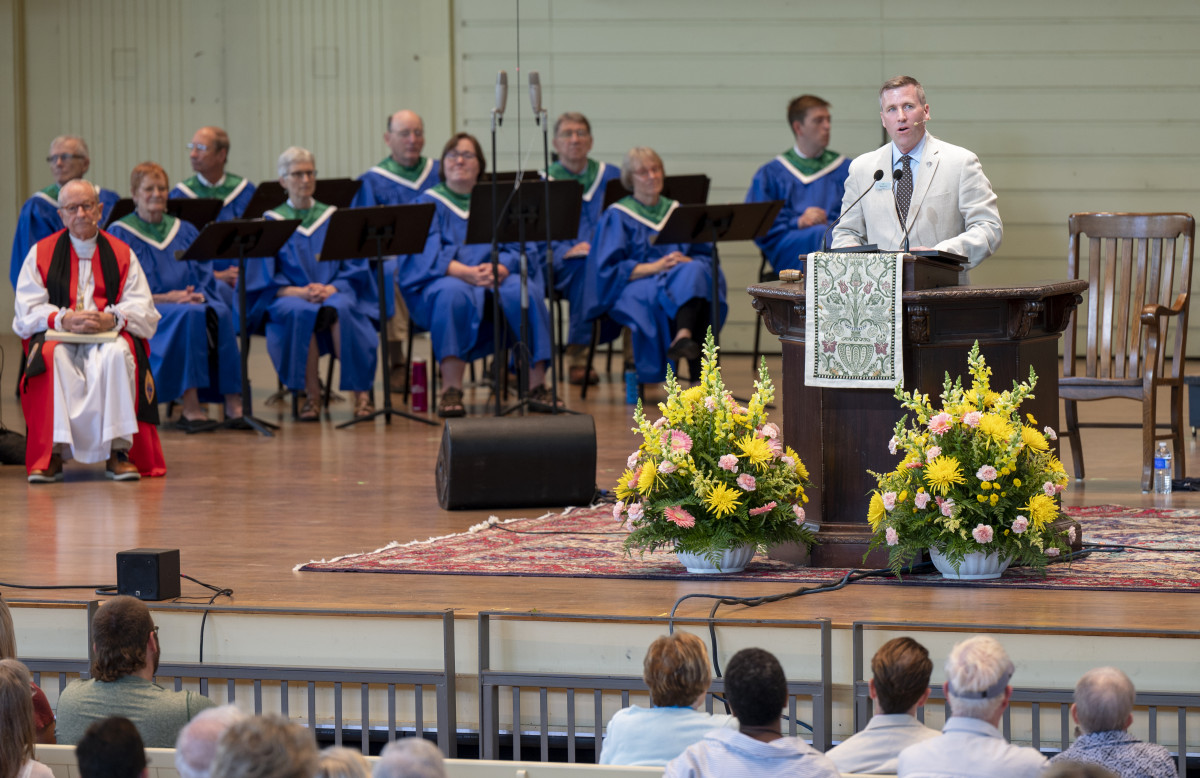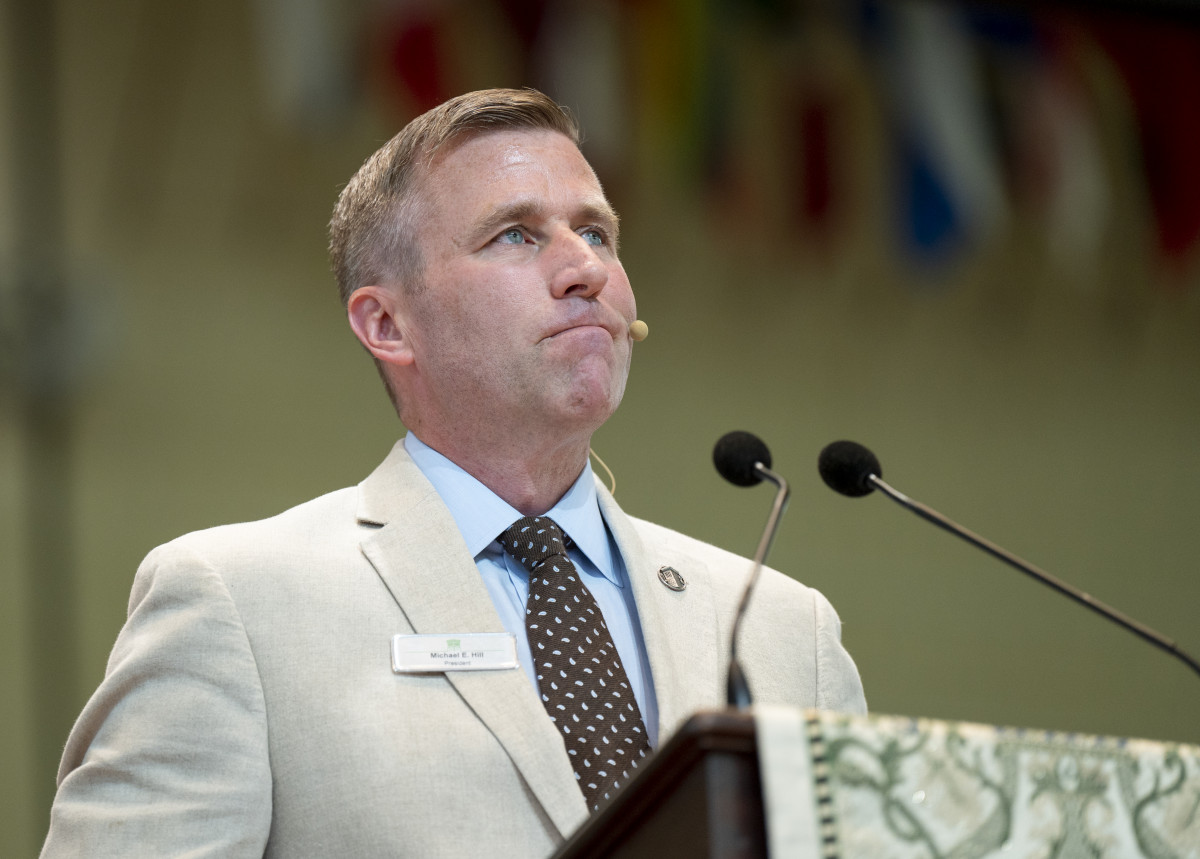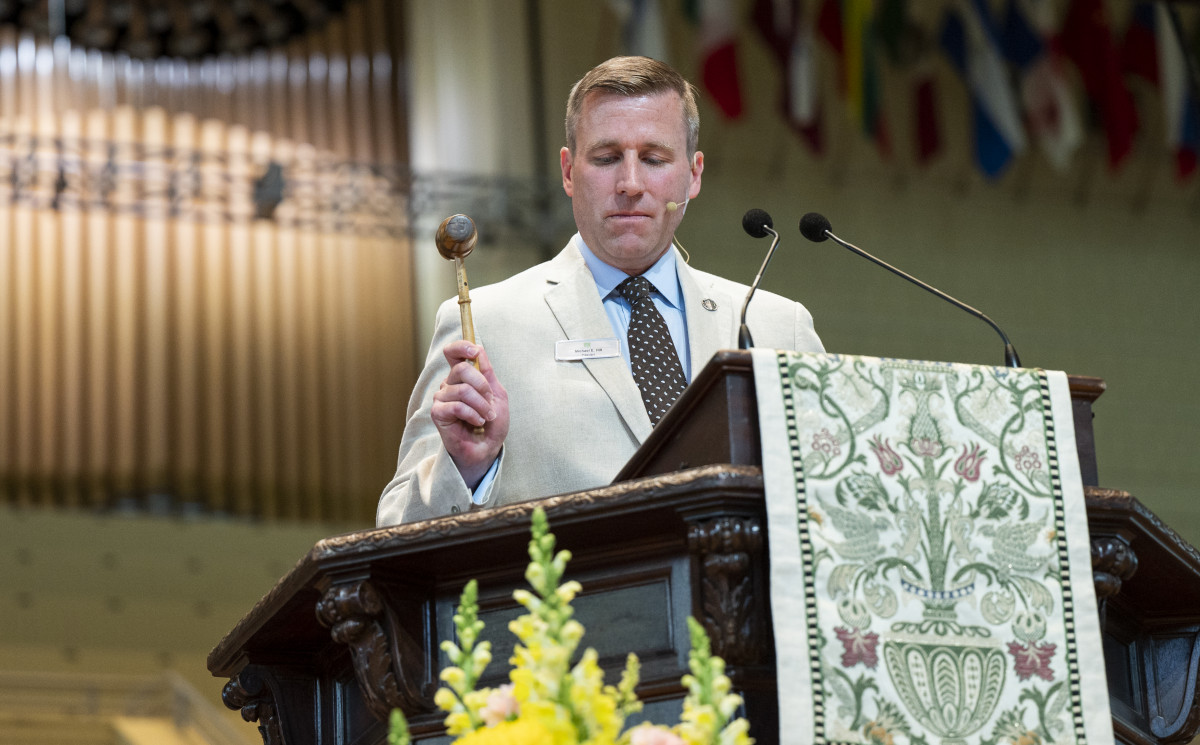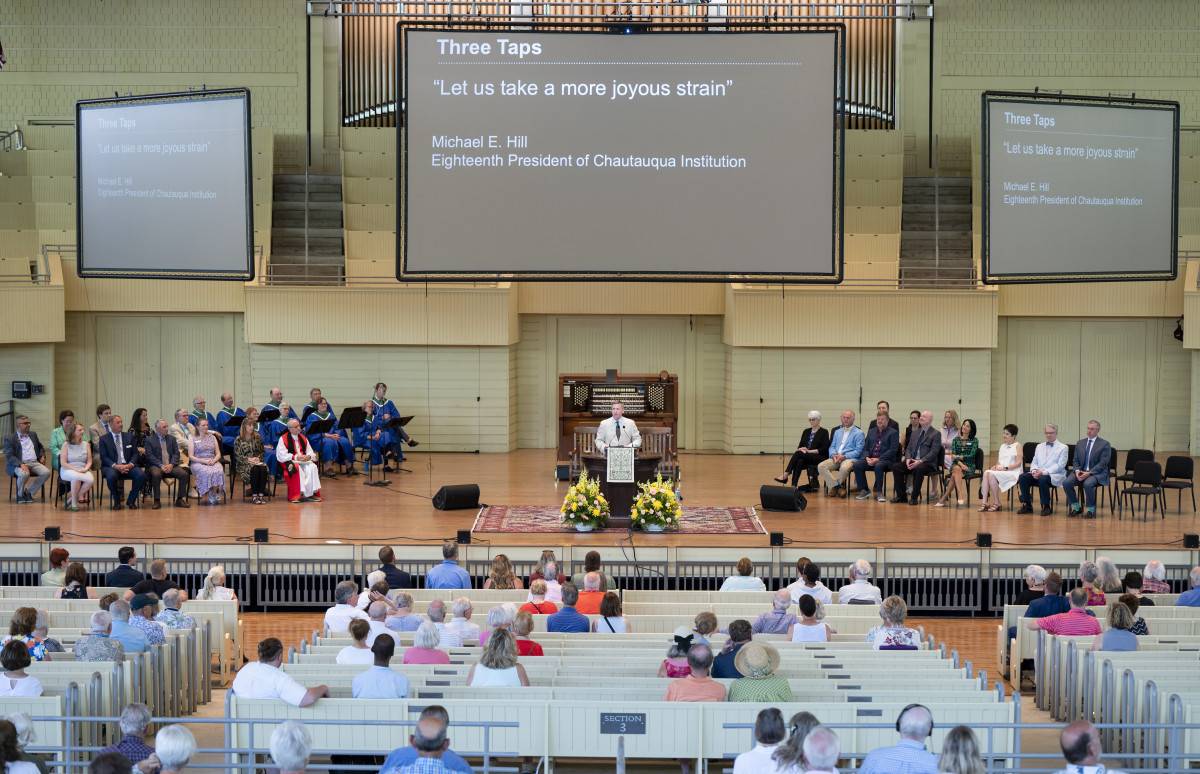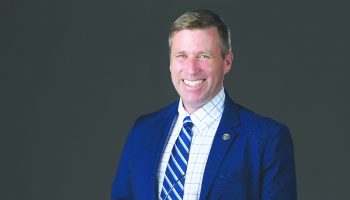Editor’s Note: These are the prepared remarks for Chautauqua Institution’s President Michael E. Hill’s annual Three Taps of the Gavel address, delivered at Sunday’s morning worship service in the Amphitheater.
The long winter of our discontent may not be quite over in the world, but it sure is looking a lot like summer at Chautauqua.
I have spent the last several days getting to welcome many of you back to the grounds. We’ve been through so much, individually and collectively, since we were last together. It has been wonderful to share your stories and to share some of my own, including the news that since our last in-person Assembly, Peter and I were married, and we joined the mighty ranks of Chautauquans with a dog — a puppy that, like so many, enjoyed the 17-year arrival of cicadas. I know Wilbur, our 6-month-old golden retriever, looks forward to saying hello this summer.
It is sometimes hard to even remember all we have seen and experienced through this surreal time in human history, among the most challenging that Chautauqua and Chautauquans have ever known, and, if I’m being honest, I can hardly believe you’re here. What a difference a year makes.
Last year I delivered the opening Three Taps of the Gavel address ushering in our 147th Summer Assembly in quite a different fashion. Looking out through a teleprompter, some 4,500 empty seats were my audience. I remember trying to envision you, wondering whether you were safely in your homes, praying that we had not lost any of you to a virus that was still deeply mysterious. I remember thinking about the launch of CHQ Assembly as a lifeboat to stay connected, and I hoped that I would never again open a Summer Assembly to an empty Amphitheater.
So here we are, you and I, reclaiming our beloved Chautauqua grounds, and today I cannot help but think about all of those who planned and sacrificed, sweated and worried, created safety plans and kept our society moving, all so we could get to this day. It is only fitting that we hold up these heroes as we start our Summer Assembly together, because it took far more than a village to bring us back. Please allow me a moment to share some of the heroics we have witnessed since our last gathering:
Chautauqua County’s Commissioner of Social Services and Public Health Director Christine Schuyler was swept to center stage when the world shut down last March. Day after day she hosted news conference after news conference, representing a calm and knowledgeable presence amid significant uncertainty. She repeatedly credited her staff for their heroics, and she sometimes represented her own humanity through tears that showed all of us that the days were long and impossible.
As the pandemic lingered, Christine kept her focus on serving the people of Chautauqua County, where she continues to lead the effort to enhance vaccine rates and reduce ambiguity.
Christine, thank you for your leadership and extraordinary commitment always — but especially over the past 15 months. We are and will remain grateful to you for getting us to where we are today. I am so hopeful a vacation is in the works. Please stand so we can publicly say “thank you” for all you’ve done.
Another in our community who faced this pandemic like a Marvel superhero is Chautauqua Lake Central School District, under the first-year leadership of Superintendent Josh Liddell. From the start of the 2020-2021 school year, Chautauqua Lake Schools represented creativity and resilience — offering multiple pathways to the classroom experience. The district just completed a remarkable 186-day school year in which it provided in-person instruction every school day for 95% or more of the district’s population. Dr. Liddell, congratulations, and thank you for the inclusive and careful way you and your staff navigated this sometimes frightening and always uncertain pandemic experience. We are fortunate to have you in our community serving as a model of caring for the youngest ones among us while demonstrating that lifelong learning especially matters at the earliest ages. Please stand for our thanks.
While I could go on for hours to recognize the many people in public office, private companies, hospitals, emergency services, police and volunteer organizations who deserve so much of the credit for our ability to be together now and through the next 65 days and beyond, I wish to also recognize the staff of Chautauqua Institution.
Starting with our Building and Grounds and Chautauqua Police teams who continued to report to work every day while most of their colleagues were required to stay home — these individuals literally and figuratively powered this place for months. And they did so with an uncommon sense of pride and deep, deep commitment. I celebrate you and the entire Chautauqua staff for navigating these difficult days as a team — with good humor, sheer courage and a special pixie dust that looks a lot like love. Every Chautauquan, here and not here, thanks you for your care and your embodiment of Chautauqua’s mission. We gratefully salute you.
I am privileged to share leadership of Chautauqua with a very special group of people. Behind me are members of our board of trustees and members of the executive management team of Chautauqua. I so often wish that all at Chautauqua could witness first-hand the selfless servant leadership of this group of people. They have worked tirelessly throughout the pandemic to preserve our most sacred traditions, to expand Chautauqua’s reach and to make it possible to safely return for a new season at Chautauqua. They have my unending gratitude, my deepest respect and my abiding love for their service.
And as part of all of that, I particularly want to take a moment to recognize the many colleagues across the Institution who responded to ever-changing rules and regulations over the course of the pandemic. Many members of our audience today might have had to make similar decisions for the companies and organizations that you lead, to continue to serve your core mission by pivoting, changing or re-evaluating your plans. This work may have left many exhausted from time to time. Some of you still might be exhausted.
I want to specifically thank our program and safety teams for the work they did to make sure that we continued to serve our mission while maintaining safety as a top priority. I also want to thank our loyal Chautauquans who were willing to roll with the changes, and most importantly those who took the time to say to our staff, “Thanks for all that you are doing.” Your deep commitment to Chautauqua, and your continued kindness and understanding is deeply valued and appreciated.
And, finally, I want to thank each of you who call yourselves Chautauquans. From donated gate passes and financial donations to words of encouragement and notes of wisdom, you reminded us of the importance of Chautauqua’s permanence in a world that felt anything but permanent. For never losing your faith in the Chautauqua ideal, for joining us in its digital expression, for seeking refuge in this place if you could, and for always, always reminding us that Chautauqua must come out the other side, your love of Chautauqua fueled all of us trying to seek a way back. Thank you.
While we take this moment to give thanks for all that has been done, we are also gearing up for our sesquicentennial in 2024. I am excited about our developing plans; but only at Chautauqua can one lay claim to three 150th birthdays, and this year is the first; the second being the 150th Assembly season in 2023 and, in 2024, marking 150 years since the opening of the first Assembly. But to the first: the grounds are 150 years old this year. It was in 1871 that the Chautauqua Lake Camp Meeting Association purchased the land, cleared the grounds and built the first auditorium in what is now Miller Park. The first camp meeting was opened on the morning of June 27, 1871 — exactly 150 years ago to this day and to this hour. Those early Chautauquans had a sense of the sacredness of this space, as the Rev. Carruthers opened the meeting with a sermon based on Matthew 18:20: “For where two or more gather in my name, there am I.”
But those who organized that first, modest gathering could have had no idea that they were laying the groundwork for such a legacy. When our wonderful archivist, Jon Schmitz, told me of this anniversary date a few weeks ago, my mind immediately went to this question: What are we doing today that could potentially spawn a movement worthy of mention 100 or more years from now?
Of course, it’s exceedingly difficult and dangerous to get into the business of predicting the future, so I’ll reflect with you on our hopes – those of our board of trustees and our leadership team and staff — for what the Chautauqua of today will be known for when those who come after celebrate that tomorrow.
We hope that future generations will look to this era in the life of Chautauqua as the moment that commenced a significant initiative to improve the condition of Chautauqua Lake. Amid a pandemic and related challenges, in 2020 and 2021, Chautauqua Institution launched an ambitious journey toward sustainability and ecological wellness for Chautauqua Lake in partnership with government and community leaders, and our celebrated science partner, The Jefferson Project.
“After all we’ve just been through to get to this moment, to get back here, to come home to Chautauqua, I believe nothing can stand in our way.”
-Michael E. Hill, 18th President, Chautauqua Insititution
Naming the science-based conservation of Chautauqua Lake among four top objectives in our strategic plan, 150 Forward, represents a firm commitment on behalf of the Institution that says: “We share responsibility for the care and conservation of Chautauqua Lake, and we intend to claim and maintain a leadership role in this work. We will not stop until Chautauqua Lake is removed from the New York State Department of Environmental Conservation list of impaired waterways.” We see a future where Chautauqua Lake and the communities that depend on it serve as a model and example of recovery and collaboration that influences and informs freshwater conservation efforts in the U.S. and abroad.
That care for our environment was also behind the launch this year of the Chautauqua Climate Change Initiative. Like our lake initiative, this is a generational issue. But it is one to which we believe Chautauqua must commit. When future generations look back at this time in the life of this storied Institution, we hope there is overwhelming evidence that we helped to create greater awareness of climate change while also helping to bridge divides on the issue. Where there is disagreement, Chautauqua will play a role in bringing people together to focus on what they can agree on toward influencing and creating positive change for the planet.
Through the generosity of two visionary philanthropist families, starting this year, Chautauqua invests in programs during and beyond the Summer Assembly, on and off these sacred grounds, in bringing people together to consider their role in stemming the trajectory of climate change. Our new director of the Chautauqua Climate Change Initiative, Mark Wenzler, brought national attention to us already in his choice to bike — not drive or fly — from our Washington, D.C. office to Chautauqua, New York, two weeks ago. He documented his five-day trip daily on social media by highlighting the beauty of creation along the way and the fragility of our world’s ecology exposed and exacerbated by human activity.
During his short tenure with us, Mark has already begun to frame the initiative with three primary areas of focus: education, stewardship and justice. He will be with us most of the summer and will create opportunities to discuss his ideas and hear from you about yours. Mark is also hosting our first Chautauqua Travels program in November, to New Orleans, where Chautauqua will lead a group travel adventure with one-of-a-kind experiences to create deeper understanding of the impact of climate change in that part of the world, most notably the bayou region’s continuing recovery from the devastating effects of Hurricane Katrina. I’m looking forward to joining Mark on the trip, and I hope some of you will be a part of the journey.
One cannot speak of justice in the world without reflecting on the other force that has rocked the United States alongside the pandemic, namely the continued quest to address the scourge of systemic racism that has plagued our nation. This has been an issue since the founding of our nation and since you and I gathered together on these sacred grounds, in this sacred grove, the nation has again experienced too many deaths of Black and brown bodies at the hands of hatred and indifference.
So many of us have asked the question about what we can do to make a difference. I know we often feel so helpless and yet want to be a part of the solution. Dr. King gave us such a straightforward answer when he wrote, “Men hate each other because they fear each other; they fear each other because they don’t know each other; they don’t know each other because they cannot communicate with each other; they can’t communicate with each other because they are separated from each other.”
I hope that in Chautauqua’s tomorrow, you and I figure out ways to make our own corner of the world a model for inclusion, diversity, equity and accessibility, that we find ways to make Chautauqua less separated from any and all who wish to participate in our mission. I hope we realize the pledge to turn our gates into gateways. I’m so grateful that we begin this season with the leadership of Amit Taneja, our new Senior Vice President and Chief Inclusion, Diversity, Equity and Accessibility Officer. While one hire alone will not realize Chautauqua’s desired vision for IDEA, I know having someone to help us shepherd this work will take us a long way toward it, and I’m deeply grateful for all those Chautauquans who invested to make this significant step possible. Welcome, Amit.
As we celebrate the 150th anniversary of the first Chautauqua Lake Camp Meeting, we also hope that our vision to be more and do more in the world has begun to take hold. As we began our time together today, I was reminded that last year we convened our season through CHQ Assembly, our new digital collective that has allowed us to program regularly for the past year. I hope as we continue to embrace this important new resource this year and for years to come, that we will continue to find ways to transport our robust series of programs and services that exemplify the magic we create here during the Summer Assembly to any and all who cannot be with us in person. And I hope that we will more deeply explore the ways that Chautauqua can return to its roots of being as much a movement as it is a place. We learned just how important that can be when the pandemic took the gift of gathering in person, and we also learned that when we don’t choose between place and movement, as if there must be a winner and a loser, that we have the chance to do unimaginable things with and for the world.
Our distinctive formulas for diving deeper through interfaith engagement, exploring the critical issues of the day through lectures, learning and enrichment through the literary arts, and probing challenging issues through the lenses of performing and visual arts can and must be ever-more leveraged in communities and organizations across the nation with Chautauqua as a lead partner. And in so doing, I hope that the Summer Assembly itself continues to bring people here every year to engage across disciplines and amidst multiple generations of participants who seek an authentic community — all with a goal to bring newfound goodness and ideas to their other home communities.
As this Summer Assembly begins, I ask you to reflect on the themes we plan to investigate in the coming weeks. While we decide on these themes more than a year prior to the start of each season, I continue to marvel at how prescient they seem to be. In February 2020 — how did we know how important it would be to talk about empathy in 2021, much less resilience? “Navigating our Divides;” “Trust, Society and Democracy;” “Exploring Today’s Unknowns” — all these themes take on a more significant sense of importance and new meaning after what we have been through. And, most importantly, they promise to bring people of diverging perspectives together, face to face, once again. What a joy it is to be in community, at times agreeing to disagree, but always reaffirming our commitment to civil dialogue and celebrating the very best in human values.
And that’s what our forebears in that camp meeting 150 years ago really understood, isn’t it? That it is important for us to come together, to be in community, to learn and pray and laugh and cry and feel together. To feed off each other’s energy and intellect and artistry. To share in the delight of a passing greeting with a stranger, or a lengthy embrace with a long-missed neighbor.
From the first sermon on these grounds, again I recite Matthew 18:20: “For where two or more gather in my name, there am I.”
Whether you believe in a higher power or not, I know you understand the blessing that is this place and the company of one another. The expressions of joy I have witnessed across these grounds in recent weeks have been unlike any I’ve seen in my time at Chautauqua. Personally, I can’t count the number of times I’ve almost choked up in unexpected encounters with members of our community. It’s just so wonderful to see everyone again.
This moment is a gift. I urge you to feel it fully and deeply. Lean into those impromptu Bestor Plaza conversations. Allow yourself to be transported by a soaring aria. Let the majesty of the Massey Memorial Organ overwhelm you, as we all become one in its resonance.
Speaking of the Massey, the last time many of you heard this great organ in person, it was under the command of our beloved and dearly missed organist Jared Jacobsen. We shared some sorrowful days in the wake of Jared’s death, and many more since. The recent past has provided too many reminders that life is precious and fleeting.
And yet, the Massey is still here, in all its majesty, now animated by the masterful Joshua Stafford. And through wars, depressions, pandemics and the sheer toll of time, Chautauqua is here, 150 years after people first gathered in her groves, now given life anew by you. We honor our history and, especially, the adversity we’ve overcome by carrying the torch forward. Chautauqua the Place remains vibrant and full of light, after a year in which we proved Chautauqua the Movement is relevant and needed in the modern world.
I can’t help but think of Beethoven’s Ninth, a most triumphant artistic portrayal of the arrival of joy through suffering, which has countless times reverberated through this sacred space. Many of you are familiar with its final and most famous movement, an orchestration of Friederich Schiller’s famous “Ode to Joy.” One by one, the composer resurfaces and dismisses themes from the first three movements — too heavy, too dark, not joyful enough. He then introduces the choral finale by inserting his own line at the top of the poem: “O friends, not these tones! Let us take a more joyous strain.”
Friends, let this be our refrain this summer, which will still present its challenges. Whenever we feel the onset of darkness or bitterness, let us dismiss it and instead look for light and joy. Where we encounter injustice or hate, let us drive it out with justice and love. When we disagree, let us assume good faith in each other, and conduct ourselves with kindness and grace. This summer, let us take a more joyous strain.
And in this season of joyousness, let us continue to clear the ground that will have Chautauquans 150 years from now celebrating our courage and our tenacity. Let’s harness the tremendous possibilities of Chautauqua for the betterment of our corner of the world and beyond. After all we’ve just been through to get to this moment, to get back here, to come home to Chautauqua, I believe nothing can stand in our way.
So welcome home, Chautauqua, and let’s get to it.
I tap the gavel three times.
Chautauqua 2021 has begun.


